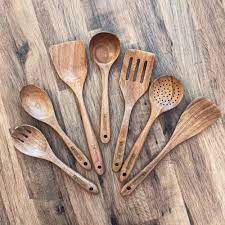While many people have an honest love for Metal utensils, there has always been the fear of it damaging other cookware when used alongside.
But does this apply to Stainless steel? This article will cover this in detail.
Will Metal Utensils Scratch Stainless Steel?
The answer to that question is yes, and no.
To put it more clearly, stainless steel is highly resistant to scratches from daily use, but it’s not completely immune.
Depending on the hardness and quality of the utensil and the steel itself, it’s possible for a metal utensil to leave a mark on a stainless steel surface.
When you use stainless steel cookware, you’ll notice that it often develops a collection of minor surface marks over time.
These are the inevitable battle scars from countless meals, an intrinsic part of the cookware’s character. However, these marks are usually superficial, and the core properties of the stainless steel ¨C its resistance to rust and staining ¨C remain unaltered.
The likelihood of a scratch developing depends on several factors such as the grade of stainless steel, the force applied, and the hardness of the utensil. Higher grade stainless steels are more scratch-resistant, while harder utensils are more likely to scratch surfaces.
So, while the fear of scratching your stainless steel pan with a metal utensil is not entirely baseless, it’s important to remember that these scratches are typically superficial and don’t affect the functionality of your cookware.
But if you want to keep your stainless steel items looking as pristine as possible, you can read to the next section where we cover other options to go with.
Other Safe Options to Use With Stainless Steel
When it comes to protecting your stainless steel cookware from scratches and ensuring longevity, choosing the right utensils can play a significant role.
While it’s fine to use metal utensils with care, there are other options you might want to consider that are also safe for stainless steel, and offer peace of mind when it comes to scratch prevention.
1. Wooden Utensils
A favorite alternative to metal for many cooks is wood. Wooden spoons, spatulas, and tongs can stand up to the heat and rigor of cooking without risking scratches on your stainless steel surfaces.

They are ideal for stirring, saut¨¦ing, and serving. Plus, they add a touch of warmth and homeliness to your kitchen that metal utensils simply can’t match.
2. Silicone Utensils
Next is silicone, the rising star in the kitchen utensil arena.
![]()
Silicone utensils are highly heat-resistant, dishwasher-safe, and gentle on all cookware surfaces.
They are also available in an array of fun colors and designs, making them a perfect blend of practicality and aesthetics.
3. Nylon Utensils
Nylon utensils offer similar benefits to silicone ones ¨C they’re heat resistant and won’t scratch your stainless steel.
Their light weight makes them easy to handle, especially when you’re standing over the stove for longer periods.
Now, one thing to note ¨C while these materials are gentle on your cookware, they also have their own limitations.
Wooden utensils can become stained and warped over time, and they require proper cleaning and drying to avoid bacteria growth. Silicone and nylon utensils, while durable, can melt if left on a hot surface for too long.
Tips to Maintain Your Stainless Steel
Maintaining stainless steel isn’t overly complex, but it does require a few key practices to keep it looking and performing its best. Let’s go through some useful tips to keep your stainless steel in top shape.
1. Regular cleaning is crucial.
After every use, wash your stainless steel cookware with warm soapy water and a soft sponge.
This will help remove food particles and prevent staining or discoloration. Always avoid using steel wool or harsh abrasive cleaners, as they can scratch the surface of your cookware.
2. Dry Them Properly
Drying your stainless steel is just as important as washing. Leftover water droplets can lead to water spots, which could be tough to remove over time.
To avoid this, always dry your stainless steel cookware immediately after washing. Use a soft cloth or towel to prevent any accidental scratches during this process.
3. Discolorations are normal
Over time, your stainless steel may develop some discoloration or rainbow-like stains due to high heat. Don’t worry ¨C this is normal and doesn’t mean your cookware is damaged.
You can use a specialized stainless steel cleaner or a homemade solution of vinegar and water to help restore the shine. Apply the solution, let it sit for a few minutes, then rinse and dry.
4. Use Soft Materials
While we’ve established that stainless steel is durable and can withstand metal utensils, it’s good practice to use softer materials when possible. As we discussed earlier, wooden, silicone, or nylon utensils can reduce the risk of scratching.
Conclusion
Although stainless steel is a sturdy and a more prefered material for cookware and kitchen utensils, it is not totally scratch-resistant. If you want to use Metal Utensils with them, then you have to be careful.




